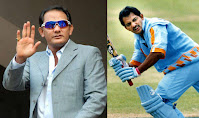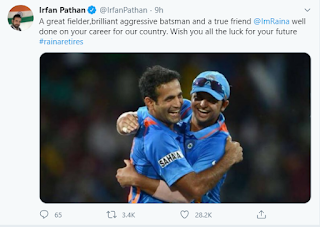Former India captain and wicket-keeper batsman Mahendra Singh Dhoni and middle-order batsman Suresh Raina in the ODI team have said goodbye to international cricket on August 15, along with these two cricketers also joined the list of those cricketers. Those who could not play the farewell match before retirement, today we are going to tell you about those 11 Indian cricketers who could not perform their last game.
These Legendary Indian Cricketers Did Not Get Farewell Match:
Sunil Gavaskar, the former captain of India and the greatest batsman of his time, who scored 10,000 runs in Tests, retired from the cricket world without playing a Farewell match, when in the 1987 Cricket World Cup. India team in England's semi-final match After losing the team to the World Cup race, then Gavaskar Saheb, known as Little Master, never appeared in international cricket.
Mohammad Azharuddin
Mohammad Azharuddin, who played beautiful shots with the help of his wrists, also got away from the cricket world without a farewell match, Azharuddin was the only player in his time who played the most games under his captaincy, when in cricket Shadow was overshadowed by match-fixing when he was accused of match-fixing at the time, after which he was banned. He stopped playing international cricket after the ban was over.
Rahul Dravid
Rahul Dravid, the most trusted batsman of the Indian team and known as Wall, was also unfortunate in this case. Dravid, who had an excellent batting performance in his first Test match, became an unbreakable part of the Test team, due to poor form Rahul Dravid Decided to say goodbye to cricket and could not even play any farewell match.
Virender Sehwag
Virender Sehwag, who is famous for his aggressive and fearless batting from Nabav in Najafgarh, is the only Indian to score first and second triple centuries in Test matches, besides Viru, who has scored a double century in ODI cricket. He also got utterly disconnected from the cricket world, and he did not have the opportunity to play the Farewell match.
VVS Laxman
VVS Laxman, who played brilliant innings of 281 runs to register a historic win in the 2001 Kolkata Test, has played a lot of great innings in Test matches for India. Still, as soon as he realized that he no longer fit in the team, he was a sworn donor. Retirement was announced at the conference.
Zaheer Khan
Zaheer Khan, one of the best fast bowlers of the country so far, played a crucial role in the team's victory in the World Cup 2011, Zaheer Khan, who is one of the world's left-arm fast bowlers, also played international cricket without any Farewell match. Abandoned.
Gautam Gambhir
Opener Gautam Gambhir, who played a vital role in the team's victory by playing crucial innings in the 2007 and 2011 World Cup finals, played many fine innings for the country, but he also did not get a chance to play a farewell match.
Yuvraj Singh
Yuvraj Singh, the hero of the 2011 World Cup and 6 sixes in 1 overs in the T20 match, did not get to play any Farewell match, Yuvraj, who has done well for the country despite battling cancer, quietly left the cricket world.
Irfan Pathan
 Irfan Pathan, the left-arm swing bowler who took a hat-trick in the first over of the Test match, won the team a lot of games based on good bowling, but when his form deteriorated, he was dropped from the group, the man of his last game. Pathan, who lives in The Match, also said goodbye to international cricket without a farewell match.
Irfan Pathan, the left-arm swing bowler who took a hat-trick in the first over of the Test match, won the team a lot of games based on good bowling, but when his form deteriorated, he was dropped from the group, the man of his last game. Pathan, who lives in The Match, also said goodbye to international cricket without a farewell match.Suresh Raina

Suresh Raina, the first Indian player to score a century in all three forms of cricket, has played a lot of memorable innings in the middle order. Still, due to being away from international cricket for some time, he thought it better to say goodbye to cricket and retire on 15 August.
MS Dhoni
One of the great captains of the country and the most excellent wicketkeeper in the world, Mahendra Singh Dhoni, stunned everyone and said goodbye to international cricket forever from the evening of August 15, a player like Dhoni would take off without playing a Farewell match.
_pk_Nobody_
















